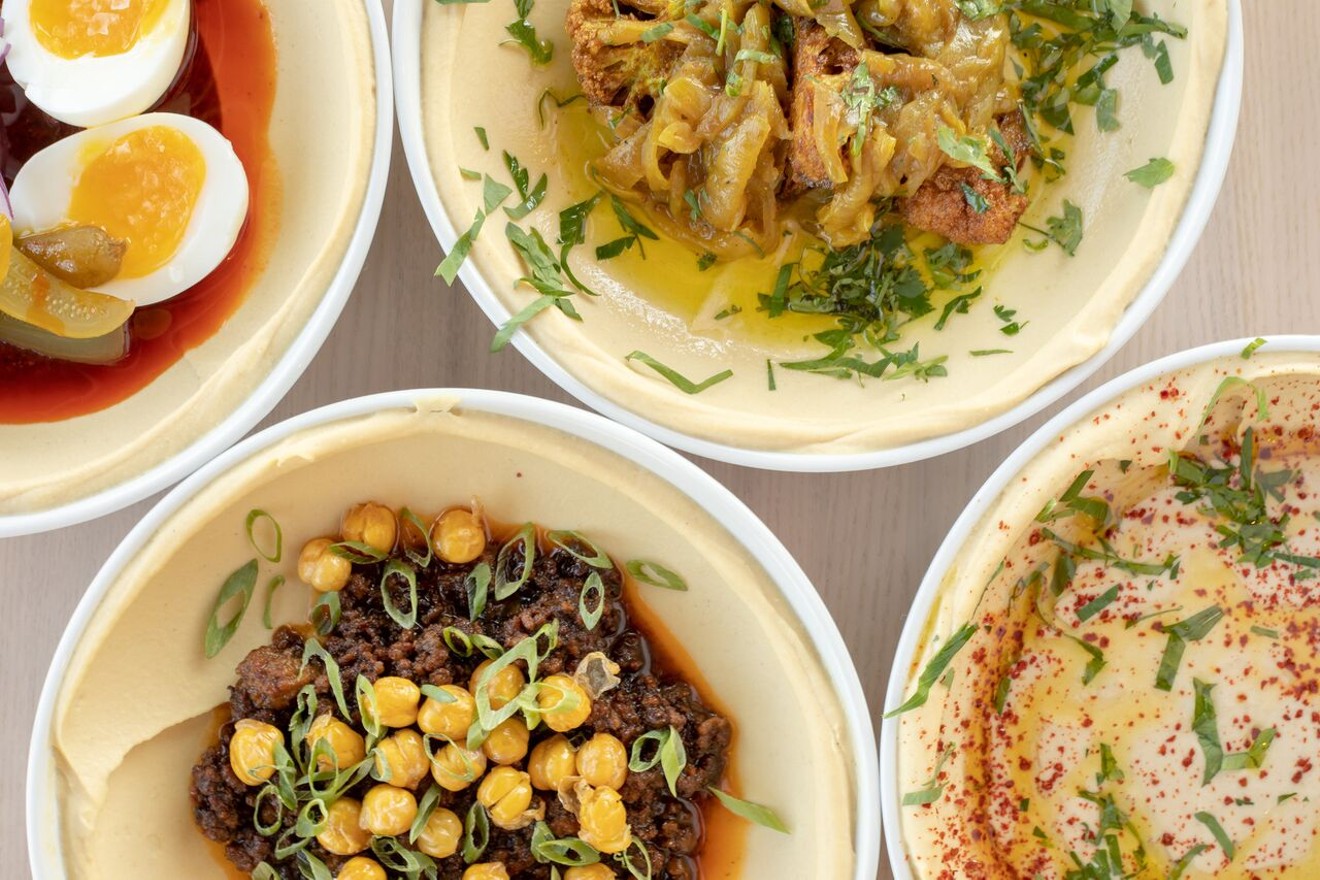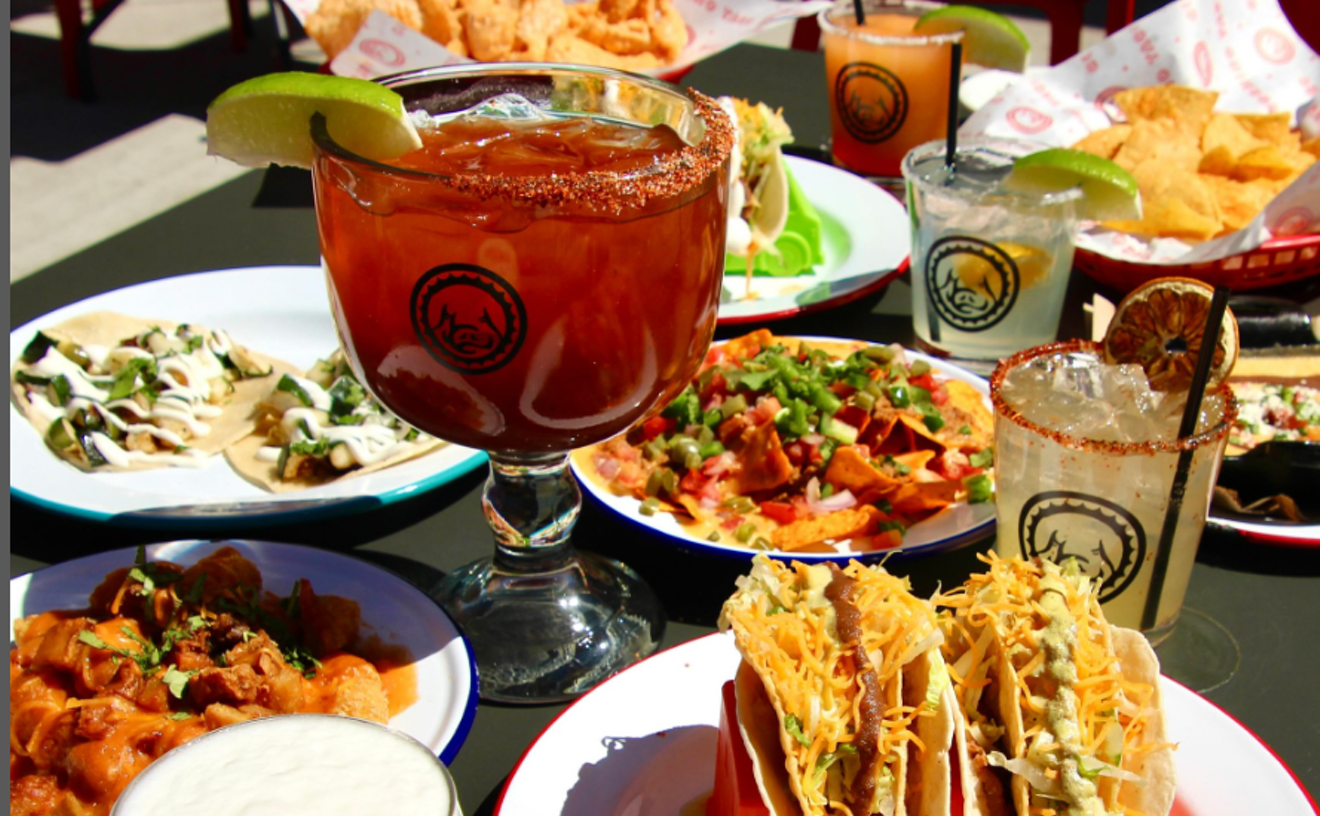When the doors officially open at the Source Hotel on August 18, they’ll reveal not just a new place to stay in RiNo, but also a suite of food options that run the gamut from a rooftop beer bar supplied by New Belgium to a barbecue joint from Oak at Fourteenth and Acorn alum William Espiricueta. And then there’s Safta, the highly anticipated Israeli restaurant from New Orleans chef Alon Shaya and Pomegranate Hospitality, the burgeoning restaurant company that the chef established after exiting BRG Hospitality Group (formerly Besh Restaurant Group) last year.
Safta, which means “grandmother” in Hebrew, is a personal project for the chef that gives a nod to his real grandmother, a Bulgarian woman who moved to Israel in 1948. “She was both a pharmacist and an amazing cook,” he explains. “Whether through medicine or food, she liked to take care of people. I looked up to her for that. As a child, I was really inspired by her. We always had that really strong bond — she’s the one who introduced me to my love of food from a young age.”
Shaya got his professional start in Italian food, and didn’t return to those Israeli roots until 2011, using his grandmother’s recipes as a cornerstone for his explorations. By that time, Shaya’s safta had passed away. “I did a lot of research, asking my mom and Aunt Debby questions about other things that she cooked,” he explains. “We had a more in-depth conversation about her thoughts on food. That taught me more about what food meant to her. I wanted to open up a restaurant that paid respect to that kind of style, thinking, hospitality and her roots in Bulgarian cooking. When [Shaya’s wife] Emily and I finally settled on opening a restaurant in Denver, it made sense for this to be the moment to do that.”
Safta also provides a counterpoint to Shaya’s new New Orleans restaurant, Saba, which pays homage to his grandfather. He sees the two as meaningful in framing the intentions of his hospitality company. “These restaurants will watch over our company and help it grow into something real and wholesome,” he says.
Shaya says that’s symbolic because he’s very consciously creating an inclusive family, after leaving BRG Hospitality because “my values didn’t align with the people I was surrounded with.” (The chef left the group after speaking to a reporter at the Times-Picayune about sexual harassment within the company.) “That was a huge step for me personally and professionally, to follow my heart and what’s right and good. Here I am after all these years — having put all this time and effort into creating these dreams, and all of a sudden I had zero. I had to really think about what was in my heart for how not only I wanted to open a restaurant, but how I wanted to take care of people.”
Pomegranate Hospitality has not only instilled inclusive values in its restaurants — and empowered employees to speak up when they see those values aren’t being followed — but it’s also built support systems to make sure it practices what it’s preaching. Shaya hired a director of people and culture, Suzy Darre, to help team members navigate professional and personal challenges, and has built a structure that prioritizes work-life balance through paid time off, full benefit coverage, and closing the restaurant on Mondays and Tuesdays to give everyone a true break once a week. Pomegranate also engaged a third-party provider that offers legal and financial advice, and mental health and addiction counseling to employees.
While Safta draws its inspiration from a real person, Shaya says his intent is to give every diner a sense of connection with their roots and their grandmothers. “It’s made to feel like you’re at home,” he explains, and everything from the flatware to the beverage list to the floral displays, curated by Shaya’s wife, Emily, are meant to derive that feeling. “You should feel like you’re at your hip grandma’s house.”
Many of those touches are personal. Water glasses suggest mid-’70s floral-patterned juice glasses, with a twist: The flowers were lifted from a pastel painting done by Shaya’s grandmother. And illustrations of both Shaya’s and Emily’s grandmothers sit above the bar, companions to portraits of their grandfathers at Saba.
Several of the chef’s grandmother’s recipes are also on the menu, including the bourekas, a crispy pastry filled with feta, black pepper and leeks, available in the market hall; fried eggplant wrapped in tomato paste and topped with goat cheese; and lutenitsa, a stew of tomato, eggplant, roasted peppers and garlic cooked for 48 hours.
Shaya tapped Jessica Nowicki as chef de cuisine, uprooting her from Chicago to preside over the wood-fired pita bread, five-deep hummus menu, salatim (salads and spreads), and small and large plates that include kebabs, falafel, crisp-edged Persian rice, braised lamb shank and duck matzoh ball soup. Frasca Food & Wine alum Liliana Myers is running the pastry program, which dabbles in traditional desserts like babka and halvah, and such inventive items as the labneh cheesecake. Much of the menu is vegetarian- and vegan-friendly, and on Mondays and Tuesdays, when the restaurant is closed, you can still pick up items like the pita and hummus, baked goods, shakshouka, and even caviar with potato chips at the Safta stand in the market hall.
As for drinks, Shaya cites a beverage program focused on wine, cider and cocktails, with high-acid options that are particularly good at cutting the heat of some of the food. Keep an eye out especially for wines from Greece, Lebanon, Slovenia and Israel. (And, yes, beer-drinkers, there is some of that, too.)
So how would Shaya approach a meal at his new restaurant? “Come hungry," he advises. "Don’t fill up on pita bread — that’s rule number one. You’ll want to, because it comes hot out of the oven, but you’ll regret it when it comes to dessert. Start with several of the salatim [salads and spreads] and order a hummus or two. Then move into some of the small plates — the crispy haloumi with apple and Turkish chiles, bright-green falafel with parsley and cilantro and served with tahini and extra-virgin olive oil, or shakshouka, which are eggs simmered in tomatoes, peppers and garlic. Then share a pomegranate-braised lamb shank with labneh and Palisade peaches, or a whole roasted head of cauliflower with whipped feta. Don’t skip dessert. There’s a chocolate hazelnut babka with hazelnut gelato and blackberries, and malabi, an Israeli street food that is a milk custard thickened with orchid root and topped with candied rose and strawberry.”
Safta, at 3300 Brighton Boulevard, will be open for lunch and dinner Wednesday through Sunday; its stand in the Source Hotel's market hall is open daily.
[
{
"name": "Air - MediumRectangle - Inline Content - Mobile Display Size",
"component": "12017618",
"insertPoint": "2",
"requiredCountToDisplay": "2",
"watchElement": ".fdn-content-body",
"astAdList": [
{
"adType": "rectangle",
"displayTargets": "mobile"
}
]
},{
"name": "Editor Picks",
"component": "17242653",
"insertPoint": "4",
"requiredCountToDisplay": "1",
"watchElement": ".fdn-content-body",
"astAdList": [
{
"adType": "rectangle",
"displayTargets": "desktop|tablet"
},{
"adType": "rectangle",
"displayTargets": "desktop|tablet|mobile"
}
]
},{
"name": "Inline Links",
"component": "18838239",
"insertPoint": "8th",
"startingPoint": 8,
"requiredCountToDisplay": "7",
"maxInsertions": 25
},{
"name": "Air - MediumRectangle - Combo - Inline Content",
"component": "17261320",
"insertPoint": "8th",
"startingPoint": 8,
"requiredCountToDisplay": "7",
"maxInsertions": 25,
"watchElement": ".fdn-content-body",
"astAdList": [
{
"adType": "rectangle",
"displayTargets": "desktop|tablet"
},{
"adType": "rectangle",
"displayTargets": "desktop|tablet|mobile"
}
]
},{
"name": "Inline Links",
"component": "18838239",
"insertPoint": "8th",
"startingPoint": 12,
"requiredCountToDisplay": "11",
"maxInsertions": 25
},{
"name": "Air - Leaderboard Tower - Combo - Inline Content",
"component": "17261321",
"insertPoint": "8th",
"startingPoint": 12,
"requiredCountToDisplay": "11",
"maxInsertions": 25,
"watchElement": ".fdn-content-body",
"astAdList": [
{
"adType": "leaderboardInlineContent",
"displayTargets": "desktop|tablet"
},{
"adType": "tower",
"displayTargets": "mobile"
}
]
}
]














